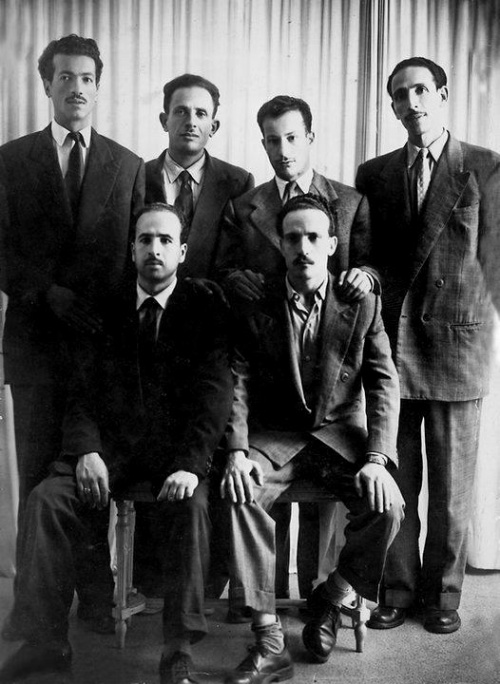Five Lessons from the Évian Accords
Amin Khan is an Algerian poet, public intellectual, and former diplomat. In this essay, he draws five specific lessons from the Algerian struggle for independence and shows how, despite internal disputes, the Algerian leadership never lost sight of the importance of unifying around the goal of achieving full independence in all of the territory of Algeria.
Ce texte est aussi disponible en français.

Amin Khan
The period of 60 years that separates us from the Evian Accords is long enough to allow us to consider - in some of its aspects at least - this event in its historical perspective, and to try and draw some lessons from it regarding the current world situation.
Today, the process of decolonization is almost complete throughout the world. Only the cases of Western Sahara and Palestine persist - incidentally, two territories close to Algeria, both geographically and historically.
Compared to other countries under colonial domination, the decolonization of Algeria is distinct in particular because of the nature and duration of the French colonization (a brutal enterprise of mass murder, dispossession, predation, a settlement colonization of 132 years) as well as by the violence of the war which put an end to it.
A fundamental characteristic of French colonial rule in Algeria was the systematic undermining of the culture of the Algerian people and the destruction of the foundations of literacy and education for several generations. Thus, the colonization managed to permanently damage the vital resources of Algerian society and to annihilate its elites and the very possibility of their formation. It is in these disastrous conditions that the Algerian people found deep within itself the resources of the revolution it led against French colonialism, forging within the war itself the military, political, and diplomatic instruments of its fight.
From the outset, in the proclamation of November 1, 1954, the National Liberation Front (FLN) defined its action as an anti-colonial struggle integrating its national and international dimensions and defined among its objectives “the internationalization of the Algerian problem”. At the time when it launched the war of national liberation, the FLN, in its very first statement, declared "its desire for peace and its will to limit the loss of human life and bloodshed, and put forward an honorable platform of discussion to the French authorities" with the objective that they recognize the "right of the Algerian people to self-determination". The FLN also demanded the opening of negotiations with the authorized spokespersons of the Algerian people based on the recognition of Algerian sovereignty, one and indivisible.
It is quite remarkable that the war of national liberation (1954-1962), despite an extremely unfavorable balance of power for the Algerian fighters, resulted in the total achievement of the objectives of November 1, 1954, as evidenced by the negotiation and the conclusion of the Evian Accords.
What are the main reasons (and lessons) for this historic success?
If the decision to start the war of liberation comes at a time of very serious crisis within the national movement (divisions, demobilization, doubts, etc.), particularly within its main party, the PPA-MTLD, this decision is taken by a small group of revolutionary militants trained and hardened by long years of political struggle against colonialism. These militants have a clear vision of the objective: the achievement of national independence. They are aware of the weakness of their means, but are animated by a great force of conviction, and know that they express a deep popular aspiration. Until the signing of the Evian Accords, the leaders of the revolution will not deviate from the objective of the achievement of "Algerian sovereignty, one and indivisible", despite the obstacles erected one after the other on their path, in particular the intensification of the war by the second army in the world after the return of De Gaulle to power, the maneuvers of division of the FLN and the ALN (the meeting at the Elysée between De Gaulle and the heads of the Wilaya 4), the attempts to partition Algeria (Hersant plan, Peyrefitte plan), the attempt to separate the Sahara from "northern Algeria"... The foresight and intransigent firmness of the Algerian leaders and the immense sacrifices of the Algerian people have made it possible to achieve the objective of independence and sovereignty, one and indivisible.
Another reason for the success of the Évian negotiators lies in the ability of the GPRA to maintain its unity despite the clash of conflicting political lines within the FLN leadership, naturally exacerbated by enmities and rivalries, and personal confrontations which sometimes lead to the paralysis of the government (which ends up relying on the "military" as in the case in 1959 of the "100 days meeting" or "meeting of the 10 colonels", or even, tragically, in resorting to violence (hasty trials, physical liquidations). But despite these serious dangers for the continuation of the struggle, the FLN has always finally managed to make compromise prevail within its ranks over open confrontation, and therefore to minimize its internal contradictions and to present a united front in the negotiations with France.
A third reason can be found in the high level of ethics that prevailed among the leaders of the FLN and among its negotiators. The collegiality of the organization and the action of the delegation was not faulted despite the maneuvers of the other party. So, when, at a crucial moment in the Evian negotiations, the head of the French delegation, Louis Joxe, asks to meet face-to-face with the head of the Algerian delegation, Krim Belkacem, the latter will go to the meeting but will not commit to anything before referring to the other members of the delegation. According to the same principle, the GPRA will never fail to inform and consult its ministers in detention (Ait Ahmed, Ben Bella, Bitat, Boudiaf, Khider), just as it will inform and have the content of the agreements approved by an open vote by the National Council of the Algerian Revolution (CNRA) before the signing of the Accords.
The democratic ethics of the FLN leadership is also reflected in the role granted by the GPRA to the expertise available within the nationalist ranks. Faced with the first diplomacy in the world, faced with French military experts, faced with some of the most renowned law experts in the world, the Algerians have mobilized the knowledge available within their ranks. From this point of view, one can see that the state of mind (patriotic, democratic, respectful of competence) which prevailed among the Algerian leaders made it possible to make the best use of the knowledge available and to achieve the best interests of Algeria and of his people in an extremely difficult negotiation.
Finally, it is necessary to underline the relevance of the diplomatic strategy of the Algerian revolutionaries. Indeed, they will refuse in a clear and unequivocal way any truce in the fighting before the objective (self-determination) is achieved. The maintaining of this position is all the more admirable since that in the last two years of the war, the National Liberation Army (ALN) as well as the population as a whole had been terribly tested by the ferocity of a war, systematized and intensified by De Gaulle, who, unable to prevent the independence of Algeria, aimed to reduce the ranks of the combatants as much as possible, to deprive them of the support of the population and to undermine the position of the negotiators. The ceasefire will therefore only occur after the signing of the Evian Accords and the recognition of the right of Algerians to self-determination and independence of their homeland, one and indivisible.
Related Resources
| Andrew H. Bellisari, The Evian Accords: An Uncertain Peace |
| Lambert, Léopold. États d’Urgence: Une histoire spatiale du continuum colonial français. Paris: Premier Matins de Novembre, 2021 |
| Lambert, Léopold. “Summer 1961: When France was considering creating a ‘French Israel’ in Algeria.” The Funambulist. January 29, 2019. |
|
L'Algérie à Evian, by Redha Malek, an insider’s account by the spokesman for the Algerian delegation at Evian.
|

The Évian Accords Turn 60
This project has been produced by Dr. William B. Quandt in commemoration of the sixtieth anniversary of the signing of the Evian Accords, which set the stage for the end of France’s largest colonial project and opened the way for Algerians to govern themselves as a modern, independent state.
Here you’ll find a number of brief essays on the importance of the Evian Accords contributed by knowledgeable commentators alongside resources that will allow readers to dig more deeply into this most interesting moment in the history of decolonization.
